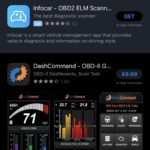The 2010 Malibu 2.4 Obd2 Code C0131 indicates a problem within the vehicle’s antilock brake system (ABS), specifically related to the ABS control module or its communication with other vehicle systems; addressing this code promptly is essential for maintaining optimal safety and vehicle performance, and MERCEDES-DIAGNOSTIC-TOOL.EDU.VN can guide you through the diagnostic and repair process. Understanding the intricacies of ABS, sensors, and modules ensures effective troubleshooting and repair, and exploring resources like Alldata and Mitchell 1 can enhance your knowledge of automotive diagnostics.
Contents
- 1. Understanding the Basics of OBD2 Code C0131
- 1.1. What Does OBD2 Stand For?
- 1.2. What is the Antilock Brake System (ABS)?
- 1.3. What Does the Code C0131 Specifically Indicate?
- 2. Common Symptoms Associated with the C0131 Code
- 2.1. ABS Warning Light Illumination
- 2.2. Reduced Braking Performance
- 2.3. Unusual Noises During Braking
- 2.4. Difficulty in Controlling the Vehicle During Emergency Stops
- 2.5. Inactive ABS System
- 3. Potential Causes of the C0131 Code in a 2010 Malibu 2.4
- 3.1. Faulty ABS Control Module
- 3.2. Damaged or Corroded Wiring Harness
- 3.3. Defective Wheel Speed Sensors
- 3.4. Low Brake Fluid Level
- 3.5. Air in the Brake Lines
- 3.6. Hydraulic Circuit Malfunction
1. Understanding the Basics of OBD2 Code C0131
The OBD2 (On-Board Diagnostics II) code C0131 is a diagnostic trouble code (DTC) that signifies an issue within the antilock brake system (ABS). Specifically, it often points to a problem with the ABS control module or its communication with other systems. Understanding this code is the first step in diagnosing and resolving ABS issues.
1.1. What Does OBD2 Stand For?
OBD2, or On-Board Diagnostics II, is a standardized system used in vehicles to monitor and diagnose engine and other system-related issues. It was introduced in the mid-1990s and became mandatory in the United States for all cars manufactured after 1996. The primary function of OBD2 is to provide a standardized way for technicians and vehicle owners to access information about the vehicle’s health.
1.2. What is the Antilock Brake System (ABS)?
The Antilock Brake System (ABS) is a safety feature designed to prevent the wheels from locking up during braking. By preventing wheel lockup, ABS allows the driver to maintain steering control and reduces stopping distances, especially on slippery surfaces. ABS works by monitoring the speed of each wheel and modulating the brake pressure to prevent any single wheel from locking.
1.3. What Does the Code C0131 Specifically Indicate?
The code C0131 specifically indicates a problem with the ABS control module, hydraulic circuit or its ability to function correctly. This code suggests that the ABS system is not operating as expected, which can compromise the vehicle’s braking performance.
2. Common Symptoms Associated with the C0131 Code
When the C0131 code is triggered in a 2010 Malibu 2.4, several symptoms may become apparent. Recognizing these symptoms can help you identify the problem and take appropriate action.
2.1. ABS Warning Light Illumination
One of the most common symptoms is the illumination of the ABS warning light on the dashboard. This light indicates that the ABS system has detected a fault and requires attention. Ignoring this warning light can lead to safety issues.
2.2. Reduced Braking Performance
The ABS system may not function correctly, leading to reduced braking performance. This can manifest as longer stopping distances or a lack of ABS engagement during hard braking. Drivers may notice that the wheels lock up more easily than usual.
2.3. Unusual Noises During Braking
Unusual noises, such as grinding or squealing, may occur during braking. These noises can indicate mechanical issues within the ABS system or the brake components themselves. Identifying the source of the noise is crucial for accurate diagnosis.
2.4. Difficulty in Controlling the Vehicle During Emergency Stops
Drivers may experience difficulty in controlling the vehicle during emergency stops. The ABS system’s failure to prevent wheel lockup can result in a loss of steering control, increasing the risk of accidents.
2.5. Inactive ABS System
The ABS system may become inactive, meaning it does not engage during situations where it is needed. This can occur if the ABS control module is not functioning correctly or if there is a communication issue with other vehicle systems.
3. Potential Causes of the C0131 Code in a 2010 Malibu 2.4
Several potential causes can trigger the C0131 code in a 2010 Malibu 2.4. Identifying these causes is essential for effective troubleshooting and repair.
3.1. Faulty ABS Control Module
The ABS control module is responsible for monitoring and controlling the ABS system. A faulty module can lead to the C0131 code. This can be due to internal component failure, electrical issues, or software problems.
3.2. Damaged or Corroded Wiring Harness
The wiring harness that connects the ABS control module to other components can become damaged or corroded. This can disrupt the electrical signals and trigger the C0131 code. Inspecting and repairing the wiring harness is crucial for resolving this issue.
3.3. Defective Wheel Speed Sensors
Wheel speed sensors monitor the speed of each wheel and provide this information to the ABS control module. Defective wheel speed sensors can send inaccurate data, leading to ABS malfunctions and the C0131 code.
3.4. Low Brake Fluid Level
A low brake fluid level can affect the performance of the ABS system. Low fluid can cause the ABS to malfunction, triggering the C0131 code. Checking and maintaining the correct brake fluid level is essential for proper ABS function.
3.5. Air in the Brake Lines
Air in the brake lines can also cause ABS issues. Air bubbles can interfere with the hydraulic pressure required for ABS operation, leading to the C0131 code. Bleeding the brake lines to remove air is a necessary step in resolving this problem.
3.6. Hydraulic Circuit Malfunction
The ABS system relies on a hydraulic circuit to modulate brake pressure. Malfunctions within this circuit, such as blockages or leaks, can cause the C0131 code. Inspecting and repairing the hydraulic components is essential.

